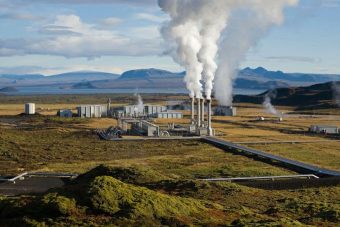
The vast geothermal potential throughout Central America could be a key tool in the low-carbon economic development of the region according to the International Renewable Energy Agency.
Central American countries currently rank among the world’s top countries in terms of installed geothermal energy share, but have the potential to increase their installed geothermal capacity up to 20 times, if governments in the region are able to adopt the necessary policy and regulatory frameworks designed to support geothermal deployment, according to the International Renewable Energy Agency (IRENA). As of the most recent figures from the Geothermal Energy Association (GEA) (October, 2016, PDF) the global geothermal power production figure sits at 13.8 GW (gigawatts), but if current growth trends continue could expand to more than 23 GW in 2021.
Specifically, the GEA report highlighted “Developing nations in Central America, the Caribbean, Southeast Asia, and the South Pacific are accelerating their geothermal development through more attractive fiscal incentives and geothermal-specific legislation.”
Central American countries already have impressive geothermal capacity, such as Costa Rica, which currently has 207 megawatts (MW) worth of geothermal capacity, but by 2024 will likely add at least another 165 MW. Close behind is El Salvador with 204 MW, and Nicaragua a long way down with 55 MW — although, IRENA’s figures differ from the GEA’s, which currently estimate Nicaragua’s current capacity at around 109 MW, with another 10 MW in the pipeline.
The future of geothermal energy in Central America was the central focus of a workshop held in El Salvador on Monday, organized by IRENA and LaGeo, El Salvador’s state-owned generator of electricity from geothermal resources, and in association with Deutsche Gesellschaft für Internationale Zusammenarbeitis (GIZ).
“Central America holds some of the world’s most promising geothermal resources, that if utilised can help the region secure and deliver, inexpensive electricity while stimulating low-carbon economic growth,” said Gurbuz Gonul, Acting Director of Country, Support and Partnerships at IRENA. “Through the sharing of knowledge, experience and lessons learned from the leading geothermal countries in Central America, this workshop will help establish the building blocks for the stable, long-term policy framework needed to overcome barriers in geothermal development.”
“The development of more geothermal projects in the Central America region can boost the economy and contribute to the reduction of greenhouse gases,” said Ms. Tanja Gabriele Faller, Regional Director of GIZ’s Programme for the Promotion of Geothermal Energy in Central America. “Our Program for the Promotion of Geothermal Energy, implemented by GIZ on behalf of the German Government, supports this type of exchange of experiences, a resource as valuable as geothermal energy has to be tackled from different perspectives. For several years we have been working together with IRENA because we share its commitment to support countries in their transition to a renewable energy future.”
Source: cleantechnica.com

